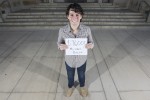What is “The Godfather”?
On one hand, it’s the 1972 best picture Oscar winner that Rodney Dangerfield credits for inspiring his most famous line. On the other hand, it’s what UCLA graduate student Michael Bilow said to rake in $57,198 and grab a No. 3 spot on the list of all-time “Jeopardy!” highest one-day totals.
Thus far, three episodes of Bilow’s $96,000 run on “Jeopardy!” have aired, with the most recent Tuesday episode ending with his name getting in the record books.
Bilow was first exposed to trivia shows through the children’s show “Where in the World is Carmen Sandiego?” before eventually watching “Jeopardy!” as well. But his penchant for pursuing little tidbits of information about the world would also take off at a very young age.
“(My uncle) got me an almanac world atlas for my eighth birthday, and it had the number of tons of soybeans produced by each country … and I’d read it,” Bilow said. “(They’re) the most uninteresting facts in the world. … I loved it because I was a big nerd even at that age.”
Bilow’s first foray as a participant of trivia games began by competing at Quiz Bowl while he was in high school in Chicago. During his senior year, Bilow’s team placed fourth, and his efforts earned him a place on the All-State second-team and a spot representing Team Illinois at the Panasonic Academic Challenge, now known as the National Tournament of Academic Excellence.
Despite his success at the high school level, Bilow doesn’t consider himself a trivia buff, nor did he have much of a structured method of preparing for the tournaments. Instead, what he did was just get curious.
“I don’t like trivia that much to be honest,” Bilow said. “I just have a really good memory, and I’m interested in a lot of stuff, so it’s not hard for me to go down the Wikipedia rabbit hole.”
In 2007, it was time for Bilow to join the trivia big leagues. Then an undergraduate at Yale University, Bilow passed the online “Jeopardy!” tests, but he was unsuccessful in the interview process.
In the summer of 2013, Bilow applied for a spot on the show for a third time. But now, he’d be equipped with three years of comedy improv experience, having begun that endeavor in 2010, and it helped him make a big impression.
“He’s got a really strong presence; he was always having a good time,” said Maggie Speak, a Jeopardy! producer. “I was watching at home, and it was just a true pleasure to watch him play the game.”
Bilow’s friend and improv team member Eileen O’Connell who was present at the tapings said she thinks Bilow’s experience with improv helped him by not only providing a calming effect, but also because of how similar the feeling of going up on both stages can be.
“Improv is all about living in the moment,” O’Connell said. “When you’re on a game show, you have to do that. If you get one question wrong, you can’t let yourself get beaten up by that.”
While Bilow’s personality has managed to entertain during the run, so did his run-and-gun approach to the game.
“There are people on Twitter saying Friday’s game was the best they’d ever seen because me and Eric Swanson really had a slugfest,” Bilow said.
Bilow held on to the lead with his $11,200 tally, but Swanson managed to eclipse that amount by $3,600 by cashing in on his $5,000 Daily Double wager.
A series of right answers saw Bilow reclaim his lead at $14,800, but only by $400. With the Daily Double sound blasting in the background, Bilow decided to put $7,000 on the line.
“What I wanted to do when I started playing was to be entertaining,” Bilow said. “If I was going to win, I was going to win big. If I was going to lose, I wanted to flame out.”
The category: Big Words. The clue: This synonym for “gigantic” was in use more than 200 years before a 1912 event put a new spin on it.
The camera’s focus on Bilow was unable to mask his furrowed brows as he began mouthing words to himself. But that expression soon changed to a smile, then a nod.
“I was like ‘1912, 1912, 1912, what happened in 1912? Titanic, yes,’” Bilow said. “That spark of what (word) means big and famously happened in 1912, I don’t think it happens every time. If I’m asked that question a hundred times, how many times do I get it? I don’t know, maybe fifty, maybe a lot less.”
Bilow said he plans to use part of his winnings to invest in a future project of his friend and improv teacher, Brian O’Connell, after enjoying O’Connell’s recent Slamdance Film Festival feature, “Bloodsucking Bastards.”
As for Bilow’s own future, since “Jeopardy!” contestants are only allowed one run, his only chance to get back on the small screen at the 7 p.m. time slot will be through the Tournament of Champions.
But with a spot on the “Jeopardy!” Hall of Fame, he might have a good chance to once again start providing answers with questions.

Don’t want to burst your bubble, but the largest single day win on Jeopardy was by Roger Craig, on September 14, 2010, in which he won $77,000, knocking Ken Jennings off the top spot (with only a measly $75,000). This is not to diminish Michael’s accomplishment, however. He played a great game over three days, with lots of gutsy moves. But only now did I realize he was a grad student at my alma mater, the Henry Samueli School of Engineering and Applied Science. Great work, Michael! — Michael Phelps, BS/MS Engineering, 1971